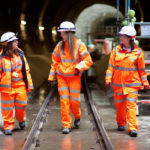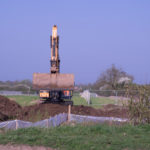Features - Brexit
Bridging the Gap in construction skills

Following Apprenticeship Week, Construction Online has been considering the skills gap within the construction sector.
The sector has been under considerable pressure for some time, with new recruits into the industry falling short of the numbers of skilled and experienced workers retiring or leaving. These problems have been exacerbated by the withdrawal from the European Union as well as the pandemic.
Construction not only suffers from an image problem, but also struggles to attract a diversity of talent from with the BAME community and women.
With the industry also urgently needing to adopt skills which will lead to better productivity and hit government targets of sustainability, we sought the opinions of those ‘on the ground’ to see how the current climate is affecting typical construction and engineering businesses.
In this Q&A, we speak with Sean Keyes, managing director, civil & structural engineering firm, Sutcliffe, about some the challenges the industry is experiencing and his thoughts on how to bridge the skills gap.
Q: What challenges do you currently see in the construction industry?
A: The obvious answers are bridging the skills gap, a lack of skilled experienced workers and rising material costs brought on by Covid and Brexit. However, at Sutcliffe we are placing a great importance on sorting the gender imbalance that we currently find within the sector and this’ll be huge in 2022 and beyond.
Females currently make up approx 11% of our sector and what I’ve found is the problem starts as far down the chain as early education and primary school. We aren’t unearthing the next generation of young female surveyors, builders and engineers at a young age, and by the time they’ve picked their GCSE options and A-Levels, a huge pool of talent is lost, in most cases forever.
When recruiting, there’s a smaller percentage of women going for above average pay positions and it is a key part of the national levelling up agenda, that these above average pay roles in the construction sector need to be represented by a more diverse group.
The construction sector is currently struggling to recruit these aforementioned women…but sadly in a lot of cases, the females that we’ve previously mentioned simply aren’t there at the moment. I believe the industry will be a better place when it truly reflects society.
Q: How can the industry promote itself to new talent?
A: At Sutcliffe we take great pride in our proactive approach to going into primary schools, secondary schools, colleges and universities to sell our business, to tell our own personal stories and to showcase our company in the best possible light.
If we are to promote our sector to new talent and a wider demographic and audience, more businesses and business leaders must do the same, by taking time out from their busy schedules to meet these young people face-to-face, as it is imperative that we employ these young men and women in order to take the construction sector to the next level.
Q: What new skills are going to be required throughout the construction industry to tackle climate change, productivity and digital transformation?
A: No matter our age, experience or job title, we must all educate ourselves on climate change and a greener future in construction, especially as we move ever close to reaching Net Zero by 2030.
COP 26 in 2021 opened a lot of our eyes to what needs to be done, but the average person still doesn’t truly understand the impacts of climate change and what this could mean for the construction sector, as well as coastal cities and towns that we live in could be lost in part to rising sea levels and coastal erosion.
At Sutcliffe, we are constantly educating ourselves on being a greener business, which links in nicely to productivity and digital transformation.
The majority of our work now takes place using state-of-the-art programmes such as AUTOCAD, BIM and REVIT, and we all need to keep on top of these new technologies as they evolve, as it is imperative that the construction sector keeps ahead of the curve, so as to not miss out on any future funding and development schemes brought in by central government.
If you would like to read more stories like this, then please click here
Related Articles
More Features
- Companies warned not to ‘fake’ diversity
3 Jun 25
Built environment firms shouldn’t do anything about improving the diversity of their workforces if they
- Immigration policy must serve Britain, not party politics – NFB
29 May 25
The Government has published a new White Paper which sets out major reforms to the
- Bridging the gap: Ibstock encourages more young people to consider career in construction
12 Jun 24
The Construction Skills Network report paints a stark picture of the extent of the UK’s






